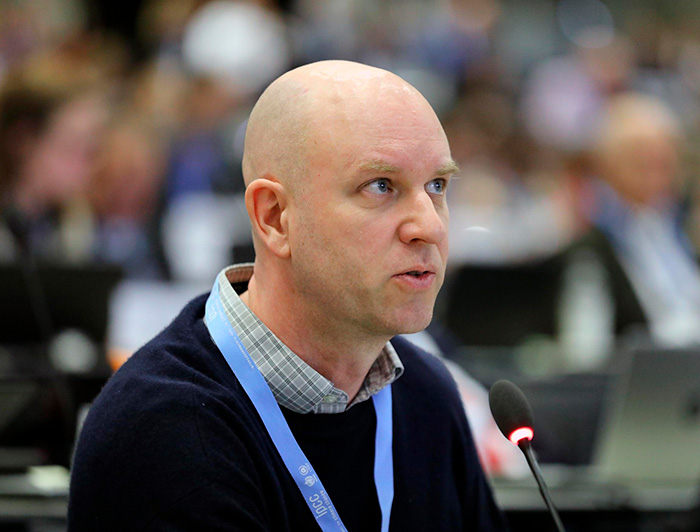The report by the renowned intergovernmental organization IPCC, the world authority on climate change, highlights the urgent need to reduce global emissions to limit global warming to 1.5 °C. Despite presenting the current status and trends, which are not very encouraging, it also offers ways to, among other things, reduce greenhouse gas emissions and increase the resilience of the planet. UC Professor Fabrice Lambert, member of the Chilean government commission, comments on some aspects of the report.
PUC Communications.- Next April 22 is celebrated the Earth day. And inevitably, it leads us to ask what we can do to adapt and help mitigate one of the biggest challenges we face as a planet: climate change.
“Human activities, primarily through greenhouse gas emissions, have unequivocally caused global warming, with global surface temperatures reaching 1.1°C above the 1850-1900 average in 2011-2020. Global greenhouse gas emissions have continued to rise, with uneven historical and current contributions stemming from unsustainable energy use, land use and land-use change, lifestyles, and patterns of consumption and production in all regions, between and within countries, and between individuals”.
This was the main conclusion of the Intergovernmental Panel on Climate Change (IPCC), in its session number 58 held last March. He sixth report is the fruit of eight years of work by almost 800 scientists, who addressed aspects of physical science; impacts, adaptation and vulnerability; and climate change mitigation.
As he explains professor at the Institute of Geography Fabrice Lambertpart of the Chilean government delegation in the instance, “this report synthesizes the findings of the three previous reports, providing a evaluation of the current state of knowledge on climate change, its causes, its possible impacts and adaptation and mitigation options. The report highlights the urgent need to reduce global emissions to limit global warming to 1.5°C, and the risks and opportunities associated with a changing climate.”
The report details the devastating consequences of rising greenhouse gas emissions around the world (for example, the destruction of homes, the loss of livelihoods and the fragmentation of communities), as well as the increasing risks dangerous and irreversible challenges that we will face if we do not change course.
However, the report is also encouraging, highlighting ways to deal with the situation. Identifies actions that can be easily implemented and, in some cases, even profitable for reduce greenhouse gas emissions, increase carbon dioxide removal and increase the resilience of the planet. Although we have less and less time, the IPCC affirms that we can still ensure a safe and livable future.

Main conclusions of the IPCC
Among the main conclusions of the report are:
1. Human-induced global warming of 1.1°C has caused changes in Earth’s climate that are unprecedented in recent human history.
2. Climate impacts on people and ecosystems are more widespread and severe than expected, and future risks will increase rapidly with every fraction of a degree of warming.
3. Adaptation measures can effectively build resilience, but more funding is needed to scale up solutions.
4. Some climate impacts are already so severe that populations can no longer adapt to them, leading to loss and damage.
5. Global GHG emissions will peak before 2025 on 1.5°C aligned trajectories.
6. The world must quickly move away from burning fossil fuels, the number one cause of the climate crisis.
7. We also need urgent system-wide transformations to ensure a net-zero, climate-resilient future.
8. Carbon dioxide removal is now essential to limit global temperature rise to 1.5°C.
9. Climate finance, both for mitigation and adaptation, must increase dramatically in this decade.
10. Climate change, and our collective efforts to adapt to and mitigate it, will exacerbate inequity if we fail to ensure a just transition.
As Fabrice Lambert says, The report “warns about the need to better understand and prepare for the risks of extreme weather events, the impacts of climate change on the global food system, and the potential for irreversible changes in some of the Earth’s systems. The report provides a clear and compelling assessment of the science of climate change and the urgency of the challenge facing humanity.”
As IPCC Director Hoesung Lee stated, the report is “a critical policy document for shaping climate action…a much-needed text” for decision makers today and tomorrow. For his part, as the UN Secretary General, António Guterres, expressed, “we are on the brink of the tipping point”, but as the IPCC report assures, it is not too late to limit warming to 1.5 °C.
What is the IPCC?
The Intergovernmental Panel on Climate Change (IPCC) was created in 1988 to facilitate comprehensive assessments of the state of scientific, technical, and socioeconomic knowledge on climate change, its causes, potential impacts, and response strategies.
With the report presented this year, there are already six climate change assessment reports that this body has prepared.
In 2007, the IPCC and former US Vice President Al Gore received the Nobel Peace Prize for their work on climate change.















